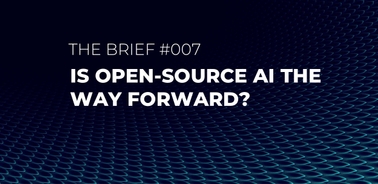- Home
- News And Events
- News
- The Brief #007 Is Open-source Ai The Way Forward?
THE BRIEF #007 IS OPEN-SOURCE AI THE WAY FORWARD?

IN BRIEF
Open-source AI is not new, but it is now making headlines. As models like DeepSeek challenge assumptions about technological power, Europe faces a question: could open-source be its path to greater influence?
THE GIST
This week, the AI landscape shifted with the launch of DeepSeek R1, a Chinese LLM that appears to match the performance of leading models like OpenAI’s at a fraction of the cost and environmental impact. While it is too early to assess the societal and political risks of this model, it’s is a big moment for us, nerds of AI geopolitics.
Many were caught off guard by this development, in part because of this dominant narrative that open-source models were far behind proprietary models. Export controls and restrictions on computing power were seen as a sufficient strategy for the US to slow down China’s progress. However, the DeepSeek surprise suggests that these barriers are not as effective as once thought.
The race to dominate AI is not just a contest between the US and China. For “AI middle powers” like the EU, the real question is not whether to compete in model development but how to position themselves in an ecosystem that may be shifting toward open-source. If this trend accelerates, could Europe seize the moment to play a more active role? Open models might lower barriers to entry, but they could also create new dependencies—on infrastructure, computing, and governance.
THE TAKEAWAY
The appeal of open-source AI lies in its potential to distribute technological influence more widely. Unlike proprietary models, which concentrate decision-making in the hands of a few companies, open models allow a broader range of actors to contribute to their development and application. This has implications for transparency, innovation, and even democratic governance. A more diverse set of contributors means models that are shaped by different perspectives, potentially making AI systems more aligned with societal needs rather than corporate priorities.
Open-source AI also prevents excessive centralization. By enabling a wider range of institutions, companies, and even governments to build on shared models, it fosters a more decentralized technological landscape. This principle has already been applied to civic engagement: platforms like Pol.is, which use AI to map public opinion in large-scale discussions, demonstrate how open technology can be used to strengthen democratic participation, from Taipei to Barcelona.
However, open-source AI does not exist in a vacuum. In an era of escalating geopolitical competition, its development raises complex questions. Will open models provide an alternative to reliance on US or Chinese technology, or will they simply create new forms of dependence?
DELVE DEEPER
Democracy Reloaded: AI to Protect and Promote Democratic Governance (Center for the Governance of Change), by Primavera de Filippi. This report explains how AI can address challenges such as declining civic engagement, disinformation, and polarization and offers recommendations for industry, public-private partnerships, and policymakers.
LLMs, Truth, and Democracy: An Overview of Risks (University of Vienna), by Mark Coeckelbergh. This paper aims to assist this effort by providing an overview of some truth-related risks in which LLMs may play a role, including risks concerning hallucination and misinformation, epistemic agency and epistemic bubbles, bullshit and relativism, epistemic anachronism and epistemic incest, and by offering arguments for why these problems are not only epistemic issues but also raise problems for democracy since they undermine its epistemic basis.
A Roadmap for AI Middle Powers by Anton Leicht. AI middle powers – that is, most advanced economies that are not the US or China – need to find a strategy for participating in rapid AI progress. Specifically, they need to find a durable connection to AI-driven economic growth and some strategic leverage in negotiations with great AI powers.